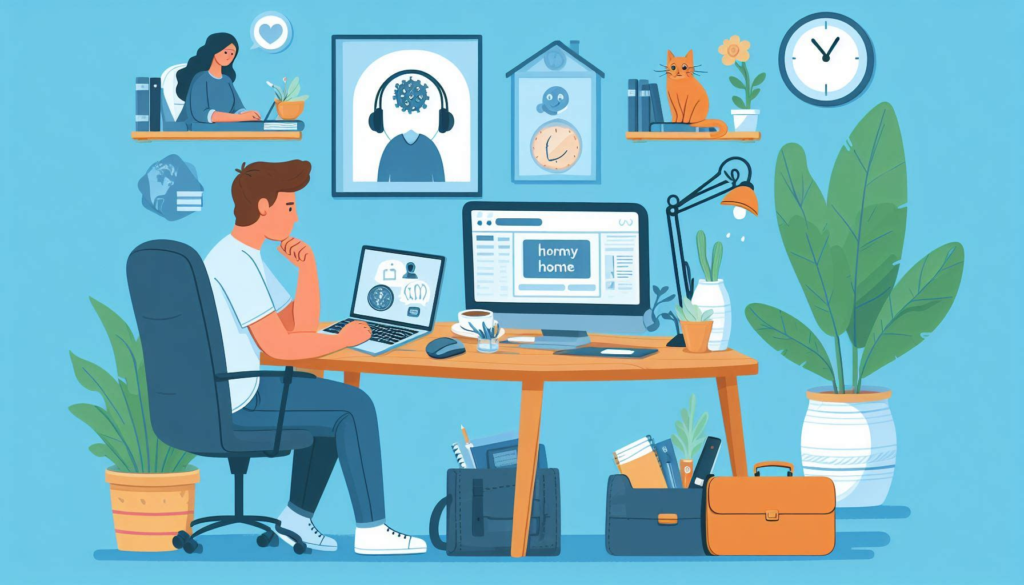Working from home rocks, right? Flexible hours, no commute, comfy clothes all day. But it also has its challenges, especially when it comes to your mental health. Don’t worry, this guide has you covered. We’ll talk about how to stay focused working from home, and ways to keep your work life and home life separate. This Guide will help you how to find support, and simple things you can do each day to stay mentally strong. In this Article you get to know Work From Home Mental Health and Guide to Staying Balanced!
Key Things You’ll Learn
- Tips for a healthy work-from-home routine
- Where to find online therapy and support for remote workers
- How to make your home office a happy place
- Tools to help you stay focused and relaxed
- The importance of staying connected, even when you work alone
Work-Life Balance: Work From Home Mental Health

Working from home offers amazing flexibility, but the lack of physical separation between your work and home life can be tricky. Without clear boundaries, it’s easy to fall into the trap of working non-stop, leading to burnout and a whole lot of resentment towards your laptop. Here’s how to find balance and protect your mental well-being:
Set Work Hours (and stick to them!)
Decide on specific start and end times for your work day and treat them like you would in-office hours. This might mean:
- Analyzing your natural work rhythm (early bird or night owl?)
- Factoring in client-facing needs or team schedules
- Communicating your hours to those you work with and live with
Take Real Breaks
Your brain and body need downtime. Get away from your desk. Move. Eat healthy food. Ideas:
- Short walk
- 10 minutes of stretching
- Quick mindfulness practice with an app
“Turn Off” Work
This is the hardest! But at the end of your designated workday:
- Close your work email and other work-related apps on your phone
- Physically shut down your work computer (if possible)
- Have a wind-down routine to signal to your brain that work is over
Why It Matters
- Prevents Burnout: Working from home makes it tempting to be “always on,” which quickly leads to exhaustion and resentment.
- Creates Boundaries: Clear work hours help mentally separate work time from personal time, crucial for remote workers.
- Improves Focus: Knowing you have a limited work window often boosts productivity compared to a vague “work all day” approach.
Online Therapy & Mental Health Support
If it feels like stress or work problems are getting too big, remember these options:
- Online Therapy: Chat with licensed therapists right from your home.
- Mental Health Apps: Apps like Headspace and Calm offer guided meditations, sleep sounds, and help with managing stress.
Your Home Office = Your Happy Place

Where you work matters. Make your workspace bright, comfortable, and distraction-free. Here’s how:
- Dedicated Space: Even a small desk is better than working on the couch.
- Good Chair, Good Light: Your body (and eyes) will thank you!
- Declutter: A messy desk = a messy mind.
The Power of Routine + Self-Care
Small daily habits make a big difference to how you feel:
- Morning Routine: Don’t just roll from bed to laptop. Get some fresh air, stretch, or listen to upbeat music.
- Move Your Body: Even a short walk on your lunch break boosts your mood.
- Sleep is Key: Aim for 7-8 hours a night so you’re fresh for work.
Don’t Go It Alone
Working remotely can be lonely. Here’s how to fight isolation:
- Virtual Coffee Breaks: Schedule quick video chats with colleagues, just to say hi.
- Online Groups: Find like-minded remote workers on Facebook or forums.
- Reach Out: If you’re struggling, virtual therapy or support groups can offer a lifeline.
Read This Also : 7 Best Posture Corrector Of 2023: Recommended By Doctors
FAQs
1. How can I maintain a healthy work-life balance when working from home?
- Set clear work hours: Establish and stick to a consistent start and end time for your workday. Avoid checking work emails or logging in outside of these hours.
- Take regular breaks: Schedule short breaks throughout the day to move, stretch, and recharge. Get away from your desk for lunch and step outside if possible.
- Separate work and personal space: If possible, designate a specific workspace. Avoid working from your bed or couch.
- Create end-of-day rituals: Shut down your work computer, change clothes, or engage in a relaxing activity to signal to your brain that work is over.
2. I find it difficult to focus at home. What are some tips for staying productive in a remote work environment?
- Minimize distractions: Close unnecessary tabs and silence notifications on your phone during work hours. Use noise-canceling headphones if needed.
- Work in time blocks: Break large tasks into smaller chunks. Use techniques like the Pomodoro method for focused bursts of work followed by short breaks.
- Optimize your workspace: Ensure you have a comfortable chair, good lighting, and any tools you need to stay organized.
- Communicate your needs: Let those you live with know when you need focused time, and set expectations for interruptions.
3. Working remotely can feel isolating. How can I combat loneliness and stay connected with others?
- Schedule virtual social time: Have regular video calls with colleagues, friends, or family members.
- Join online communities: Find groups for remote workers or people with shared interests. Many exist on Facebook, Reddit, or other platforms.
- Plan in-person meetups: If possible, schedule occasional coffee breaks or coworking sessions with other remote workers in your area.
- Don’t underestimate small talk: Take time for casual “watercooler” chats with colleagues to maintain camaraderie.
4. How can I create a mentally healthy home office space?
- Maximize natural light: Position your desk near a window if possible. If not, invest in a good desk lamp that mimics daylight.
- Add personal touches: Decorate with plants, artwork, or photos that bring you joy and inspiration.
- Prioritize comfort: Ensure you have an ergonomic chair that supports good posture and avoid working in uncomfortable spaces for extended periods.
- Keep it tidy: A cluttered workspace can lead to a cluttered mind. Take time to declutter regularly.
5. I’m struggling with work-related stress and anxiety. Are there online therapy options specifically for remote workers?
- Yes! Platforms like BetterHelp and TalkSpace offer convenient online therapy. Many therapists specialize in work-related stress and understand the unique challenges of remote work.
- Look for the right fit: Research various platforms and therapists to find someone with expertise in your specific concerns.
- EAP benefits: Check if your employer offers an Employee Assistance Program (EAP), which often provides access to free or subsidized counseling.
- Don’t hesitate to seek help: Remember, mental health is just as important as physical health. Prioritize getting the support you need.
6. What are some simple self-care practices I can incorporate into my work-from-home routine?
- Start your day right: Instead of rolling from bed to your laptop, take time for a morning routine like exercise, meditation, or simply enjoying a cup of coffee outside.
- Move your body: Incorporate short walks, stretching breaks, or online workouts into your day.
- Nourish yourself: Eat healthy meals and snacks, and stay hydrated throughout the day.
- Prioritize sleep: Aim for 7-8 hours of quality sleep each night for optimal focus and emotional balance.
7. How do I set boundaries between work and personal time when my office is in my home?
- “Turn off” notifications: Disable work-related notifications on your phone and computer outside of work hours.
- Physically separate work: If possible, close your office door or put away your work computer at the end of the day to visually separate work and personal time.
- Communicate boundaries: Let friends and family know your work hours, and set expectations for when you’re unavailable.
- Respect your own rules: When it’s time to unwind, resist the urge to check emails or respond to non-urgent work matters.
8. Are there apps or tools that can help me manage stress and improve focus while working from home?
- Mindfulness apps: Apps like Headspace and Calm offer guided meditations, breathing exercises, sleep sounds, and more.
- Focus tools: Consider website blockers like Freedom or Forest to eliminate digital distractions during designated work periods.
- Time management tools: Apps like Todoist or Trello can help you organize tasks, prioritize what matters, and avoid feeling overwhelmed.
- Music and ambient sounds: Background music or nature sounds can boost focus and create a calm atmosphere.
9. I’m a manager concerned about my remote team’s mental well-being. How can I best support them?
- Promote open communication: Encourage regular check-ins, both one-on-one and as a team. Ask about well-being alongside work progress.
- Foster a sense of community: Organize virtual team-building activities and informal chat channels for non-work conversations.
- Be flexible: Understand that remote workers might need unconventional schedules or occasional mental health days. Focus on outcomes over strict hours.
- Provide resources: Share information about online therapy options or company-sponsored mental health programs.
10. What are the signs of burnout, and how can I prevent it as a remote worker?
- Signs of burnout: Exhaustion, cynicism or detachment from work, irritability, trouble focusing, and changes in sleep or appetite are all warning signs.
- Prevention strategies: Set realistic work hours, enforce boundaries, take breaks, prioritize self-care (see FAQ #6), and seek professional help if needed.
- Manager’s role: Watch out for reduced engagement, missed deadlines, or changes in communication from team members as potential burnout signs.
Conclusion
Working from home offers great freedom, but prioritizing your mental health is just as important as getting your work done. Remember, a healthy work-life balance, a supportive workspace, daily routines, and seeking help when needed are keys to thriving in a remote environment.
